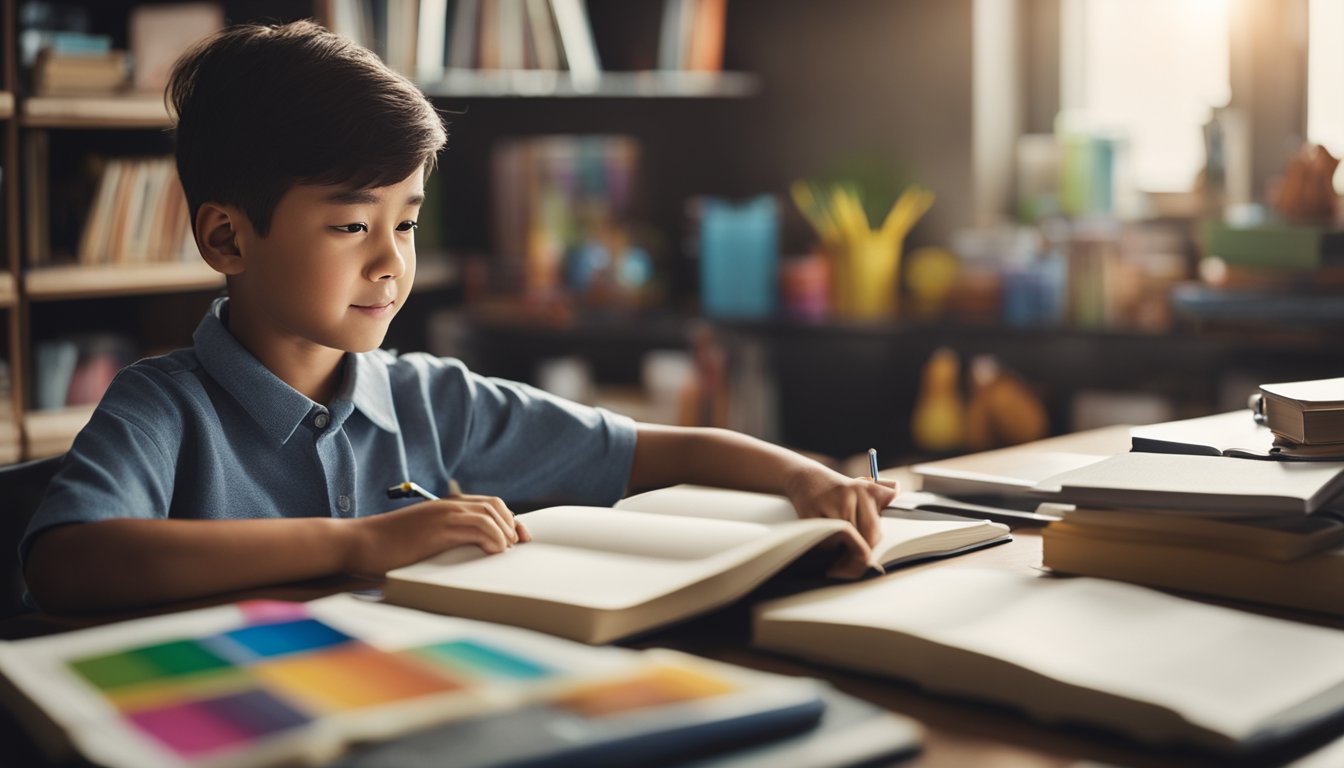Late updated: 19 Feb 2025 12:02
Written by:
Encouraging Independent Study Skills in Children: Building a Foundation for Lifelong Learning
Empowering our children with independent study skills opens new avenues in their educational journey and fosters the essence of lifelong learning. Children who develop the ability to learn independently gain the skills needed to navigate complex subjects with confidence and adaptability. As we encourage this independence, we're not just helping them master current material; we're also preparing them for future challenges by teaching them how to take control of their learning experience.

We must promote a growth mindset in our children, ensuring they understand that their abilities can expand with effort and persistence. By providing access to diverse resources and encouraging critical thinking, we nurture an intrinsic love for learning. This approach not only enhances their educational performance but also instills independence, which is crucial for their growth beyond school.
Incorporating practical strategies, such as breaking down tasks and planning ahead, can significantly enhance a child's ability to study independently. When faced with upcoming tests or projects, guiding them to manage their time efficiently and understand their learning process leads to greater satisfaction and success. By balancing structure with autonomy, we prepare them for a world that values self-directed learning.
Key Takeaways
- Empowering independent learning boosts children's adaptability and confidence.
- Promoting a growth mindset helps develop lifelong learning skills.
- Practical strategies aid in nurturing effective independent study habits.
Fostering the Foundations of Independent Study
Encouraging independent study in children involves cultivating a sense of responsibility, promoting self-directed learning, and enhancing problem-solving skills. These efforts can lead to increased self-esteem and intellectual curiosity.
Establishing Daily Routines and Responsibilities
Creating daily routines helps establish a consistent framework for children. By assigning age-appropriate chores, we build responsibility and self-sufficiency. A reliable schedule fosters comfort, offering structure and predictability.
Positive reinforcement is vital. Praising efforts and accomplishments boosts self-esteem and encourages a growth mindset. When children see that their contributions matter, they become motivated to engage with tasks independently. As a result, independent thinking flourishes, laying the groundwork for their educational journey.
Encouraging Self-Directed Learning and Reflection
Self-directed learning empowers children to explore interests independently. By allowing them choices, we nurture intellectual curiosity. It's crucial to encourage them to set personal goals and allow space for self-evaluation.
When children reflect on their experiences, they develop reflective practices. Encourage them to ask reflective questions like, "What did I learn?" Discussing their thoughts reinforces learning and cultivates confidence. These practices enhance their independent learning abilities, fostering a lifelong love for discovery and growth.
Developing Problem-Solving and Critical Thinking Skills
Problem-solving skills are essential tools in the learning process. We can encourage children to tackle challenges creatively by presenting them with opportunities to solve everyday problems. Activities like puzzles or group projects enhance critical thinking.
Developing critical thinking skills involves questioning assumptions and analysing information critically. Encourage discussions that stimulate curiosity and challenge perspectives. This fostering independence in thinking helps children adapt to new situations. By equipping them with these skills, we prepare them to navigate their academic and personal lives confidently.
Expanding Independent Study through Practical Strategies

In fostering independent study in children, we can actively promote self-reliance, autonomy, and effective decision-making skills. By guiding students with collaborative learning opportunities, creativity, and structured strategies, they can gain lifelong learning benefits and enhanced academic performance.
Incorporating Collaborative and Peer Learning
Incorporating collaborative and peer learning encourages students to become more independent. Through partnerships, students enhance their self-help skills and motivation. By working together, they can solve problems and share ideas, which fosters better understanding and resilience.
Collaboration helps children learn from diverse perspectives, building stronger decision-making skills. As they engage with their peers, they are exposed to different approaches to tasks, improving their critical thinking. Moreover, peer feedback is an invaluable tool for self-assessment and tracking progress, promoting continuous learning and improvement.
Cultivating Creativity and Initiative in Learning
Encouraging creativity in learning enables students to become more self-reliant and motivated. By allowing them to explore topics of interest, they develop initiative and a sense of ownership over their education. We can guide students to set personal goals and pursue them through creative means, fostering autonomy.
Students should be provided opportunities to think outside the box, enhancing their ability to apply knowledge innovatively. Promoting creativity can contribute to building resilience, as students learn to adapt and experiment with various solutions. This approach not only aids academic performance but also fosters a lifelong love for learning.
Maximising Academic Performance and Lifelong Benefits
Independent study skills contribute significantly to maximising academic performance. By integrating self-regulation techniques like time management and goal setting, students learn to focus and achieve better results. Encouraging self-assessment practices aids in recognising strengths and identifying areas for improvement.
Developing these skills early prepares children for higher education and beyond. They gain life skills critical for employment, such as autonomy and initiative, essential in a dynamic work environment. Promoting independence in learning improves not only academic achievements but also equips students with tools for lifelong success.
Frequently Asked Questions

Encouraging independent study skills in children is essential for their development. We will explore methods, activities, and strategies to support this goal both at home and in the classroom.
How can parents foster independence in their child's study habits?
Parents can create a learning-friendly environment at home. Providing resources tailored to their child's interests can nurture self-directed study habits. It is important to encourage critical thinking and curiosity by asking open-ended questions. Parents should also allow children the space to develop problem-solving skills independently.
What activities help enhance self-directed learning skills in children?
Incorporating educational games, books, and online courses aligned with children's interests is beneficial. Activities like journaling or project-based learning can boost their ability to explore topics independently. Encouraging participation in group discussions also helps build confidence in self-directed learning.
Which strategies are effective in teaching children to learn independently in the classroom?
Teachers can promote independent learning by incorporating tasks that require students to research and analyse information. Allowing students to choose topics for certain assignments can stimulate engagement. Providing opportunities for peer collaboration encourages students to take charge of their learning.
What are the hallmarks of successful independent learners?
Successful independent learners demonstrate curiosity and ask insightful questions. They effectively manage their time and resources and exhibit critical thinking and problem-solving skills. These learners are resilient, adapt to challenges, and remain motivated to explore new areas of knowledge.
How can teachers implement independent learning strategies effectively?
Teachers can introduce differentiated learning plans in their classrooms. Setting clear, achievable goals helps students measure progress. Incorporating feedback sessions aids students in refining their strategies. Additionally, a supportive classroom environment encourages autonomy and fosters confidence.
In what ways can independent study be integrated into the existing curriculum?
Integrating independent study within the curriculum can be achieved through interdisciplinary projects and research opportunities. Allowing for flexibility in task completion and assessment styles tailors the learning experience to individual needs. Teachers can craft lessons that incorporate student-led discussions, promoting ownership over their learning journeys.
